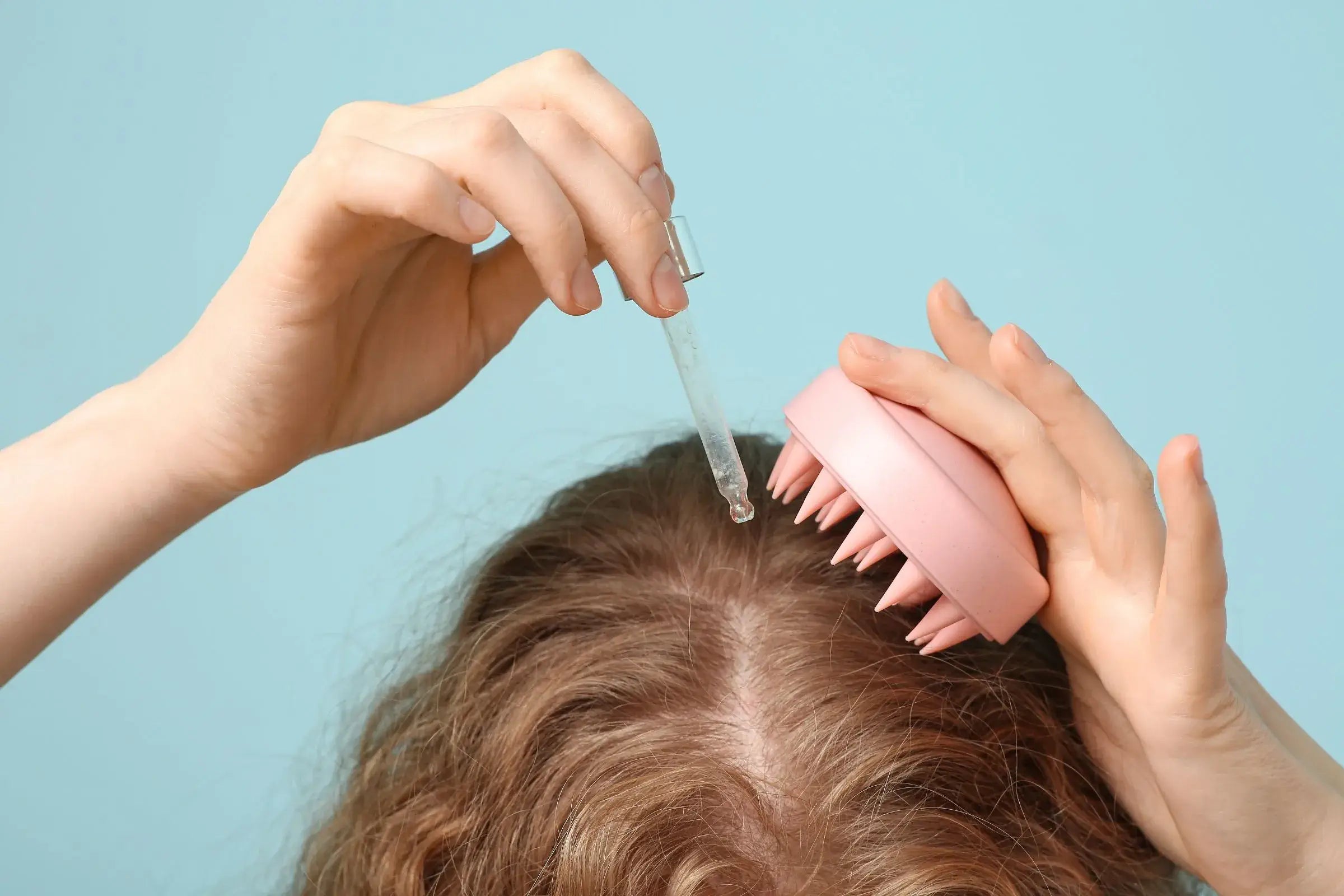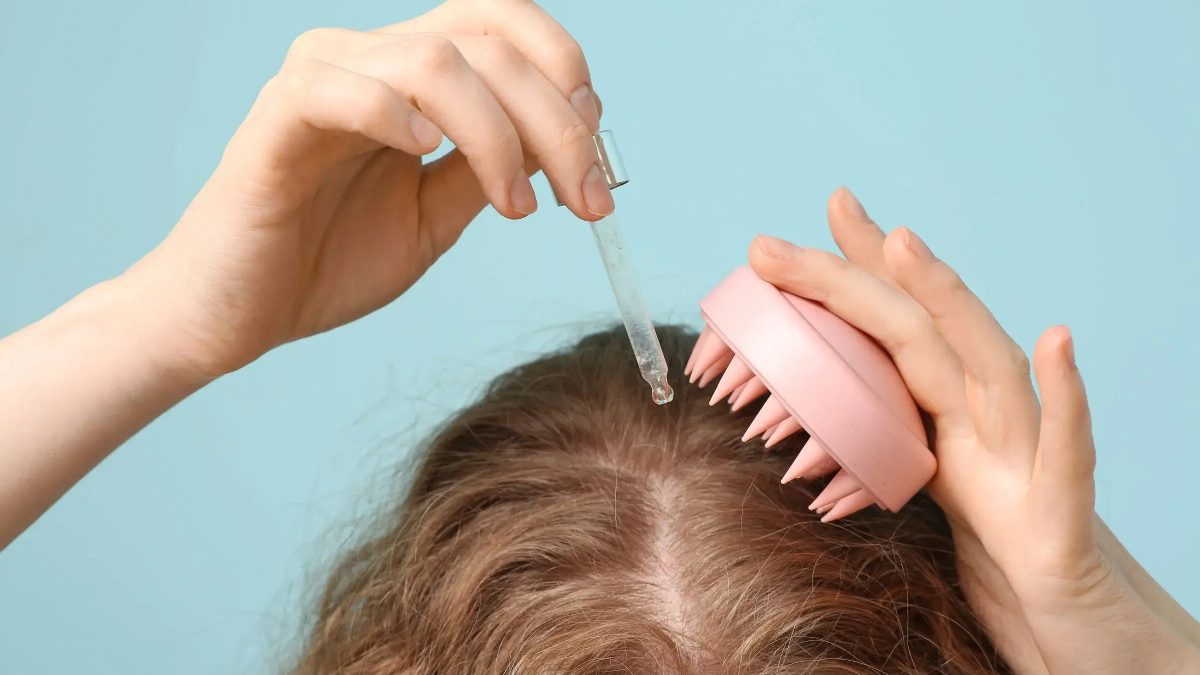Nurturing Your Scalp: The Foundation for Healthy, Vibrant Hair
Posted on September 15, 2024 Written by: 100% PURE®

When it comes to skincare people always focus on taking care of their face and neck, but what about the scalp? It tends to get overlooked, even though it’s super important.
A healthy scalp does way more than just —it’s key for strong, shiny hair and can even help keep your skin clear. When you take care of your scalp, you’re not just doing your hair a favor; you’re helping your skin stay balanced, too.
Understanding the Scalp Ecosystem
The scalp is more than just a base for hair; it’s a dynamic environment. The scalp is rich with sebaceous glands, blood vessels, and hair follicles, all working together to maintain healthy hair and skin. But what many don’t realize is the scalp also has its own microbiome—a community of bacteria and fungi that play a key role in keeping the scalp balanced.
When this ecosystem is disrupted, it can lead to issues beyond dandruff, like seborrheic dermatitis, psoriasis, and folliculitis. Keeping the scalp’s microbiome healthy is essential for overall scalp health and, by extension, healthy hair and skin.
Connection Between Scalp Health and Hair Quality
If your , your hair has the best chance to grow strong and thick. It all starts with sebum, the natural oil your scalp produces, which keeps your hair moisturized and shiny.
But when things go wrong—like if your scalp gets inflamed from stress or skin conditions—it can really mess with your hair. Inflammation can weaken your hair follicles, making your hair brittle and even changing its texture.
Key Components of a Scalp Care Routine
A is essential for maintaining healthy hair and promoting overall scalp health. Here are the key components:
1. Proper Cleansing Techniques
Gentle Shampooing: Use natural shampoos that suit your hair type. Gently massage the scalp with your fingertips to remove dirt, oil, and product buildup. Avoid harsh scrubbing, as it can irritate the scalp.
Regular Cleansing: Depending on your hair type, cleanse your scalp regularly to prevent clogging of hair follicles. For oily scalps, more frequent washing may be necessary, while drier scalps might benefit from less frequent cleansing.
2. Exfoliation for the Scalp
Scalp Scrubs: Use a scalp scrub or an exfoliating treatment once a week to remove dead skin cells and excess oil. This helps to prevent dandruff and promotes better circulation, which can stimulate hair growth.
Chemical Exfoliants: Products containing salicylic acid or other gentle acids can help exfoliate the scalp without physical scrubbing. These are especially beneficial for those with sensitive or irritated scalps.
3. Hydration and Moisturization
Hydrating Scalp Serums: Incorporate hydrating serums that contain ingredients like hyaluronic acid or aloe vera to maintain moisture balance. This is particularly important for dry or itchy scalps.
Oils and Moisturizers: Lightweight oils like jojoba, argan, or tea tree oil can be massaged into the scalp to lock in moisture. Use sparingly to avoid greasiness.
4. Protective Measures Against Environmental Stressors
Sun Protection: Just like your skin, your scalp needs protection from UV rays. Use hair products with SPF or wear a hat when exposed to the sun for extended periods.
Pollution Defense: Products with antioxidants can help protect the scalp from environmental pollutants, which can lead to irritation and hair damage in scalp-specific treatments.
Scalp Masks: Use scalp-specific masks once a week to deeply nourish and treat any specific concerns such as dryness, oiliness, or dandruff.
Targeted Treatments: Incorporate treatments designed for your scalp condition, such as anti-dandruff shampoos, soothing treatments for sensitive scalps, or strengthening treatments for thinning hair.
Common Scalp Concerns and Solutions
Dryness and Itchiness
Dryness and itchiness often result from harsh shampoos, frequent washing, or cold weather, which strip the scalp of natural oils. To combat this, and scalp oils like argan or jojoba, and avoid washing your hair with hot water.
Excess Oil and Sebum Production
Excess oil is usually due to overactive sebaceous glands or heavy hair products. To manage this, use clarifying shampoos and wash your hair regularly. Opt for lightweight conditioners and avoid applying them directly to the scalp.
Scalp Acne and Folliculitis
Scalp acne and folliculitis occur when hair follicles get clogged with oil or bacteria, causing pimples and irritation. Medicated shampoos with tea tree oil or salicylic acid can help, along with thorough rinsing of hair products to keep follicles clear.
Thinning Hair and Hair Loss
Thinning hair and hair loss can stem from genetics, hormones, or stress. To address this, use hair growth serums with minoxidil or biotin, and practice regular scalp massages. A diet rich in vitamins like iron and zinc also supports hair health.
Sensitive Scalp and Irritation
A sensitive scalp can easily become irritated by harsh chemicals or environmental factors. Use gentle, sulfate-free shampoos and avoid irritants like certain dyes or fragrances. Treatments with chamomile or aloe vera can help soothe and calm the scalp.
Ingredients to Look for in Scalp Care Products
When shopping for hair care products, it’s essential to choose those with
Tea Tree Oil: Known for its antimicrobial properties, tea tree oil helps combat scalp issues like dandruff, acne, and fungal infections.
Salicylic Acid: This ingredient is excellent for gentle exfoliation, helping to remove dead skin cells and unclog hair follicles
Hyaluronic Acid: A powerful hydrator, hyaluronic acid attracts and retains moisture, keeping the scalp well-hydrated.
Niacinamide: Also known as vitamin B3, niacinamide is effective in regulating sebum production. It helps balance oil levels on the scalp, reducing excess greasiness while also strengthening the skin barrier.
Peptides: Peptides are small chains of amino acids that support hair growth by stimulating the scalp and strengthening hair follicles.
Scalp Care Techniques and Tools
and can be enhanced with various techniques and tools.
1. Scalp massages improve circulation, promoting hair growth and relaxation.
2. Scalp brushing and exfoliation tools help remove dead skin cells and product buildup, keeping the scalp clean and refreshed.
3. DIY scalp treatments and masks, using ingredients like yogurt or honey, can provide personalized nourishment and address specific issues like dryness or oiliness.
4. Professional scalp treatments should be considered if you experience persistent problems like severe dandruff or hair loss, as they offer specialized care and advanced solutions tailored to your scalp’s needs.
Addressing Specific Hair Types and Scalp Needs
| Hair Type/Scalp Need | Care Strategies |
|---|---|
| Dry Scalp with Curly Hair |
– Use hydrating shampoos and conditioners with moisturizing ingredients like shea butter or coconut oil. – Incorporate deep conditioning treatments regularly. – Apply scalp oils to restore moisture. – Avoid frequent washing to prevent further dryness. – Use a silk pillowcase to reduce friction. |
| Oily Scalp with Fine Hair |
– Use lightweight, clarifying shampoos to control oil without stripping moisture. – Use dry shampoo between washes to absorb excess oil and add volume. – Avoid heavy conditioners and styling products. – Opt for light, oil-free formulas. |
| Color-Treated Hair |
– Choose sulfate-free shampoos specifically for color-treated hair to prevent fading. – Use protein-rich masks for hydration and repair. – Protect the scalp from the sun with hats or UV-protective products. – Avoid excessive heat styling. |
| Scalp Care for Different Seasons |
Winter: – Focus on hydration with richer conditioners and scalp oils. – Avoid harsh shampoos that can strip moisture. Summer: |
100% PURE Products for Scalp Care
100% PURE offers a selection of high-quality products specifically designed for comprehensive scalp care, blending natural ingredients with effective results. Their formulations cater to various scalp needs, from balancing and cleansing to nourishing and stimulating hair growth.
This shampoo is crafted for balanced cleansing, combining the benefits of burdock and neem to soothe and purify the scalp.
Designed to support both hair growth and scalp health, this shampoo helps enhance the vitality of your hair while maintaining a healthy scalp environment.
Ideal for a refreshing cleanse, this shampoo clarifies the scalp and adds volume, thanks to the invigorating properties of kelp and mint.
This serum provides essential nourishment to both hair and scalp, using pro-vitamin B5 to promote smoothness and hydration.
Focused on targeted treatment, this serum uses rosemary to stimulate and support a healthy scalp, encouraging optimal hair growth.
Frequently Asked Questions
How often should I exfoliate my scalp?
Exfoliating your scalp 1-2 times per week is generally sufficient. Over-exfoliating can lead to irritation and dryness, so it’s important to find a balance that works for your scalp’s condition and your hair type.
Can improving my scalp health really make a difference in hair growth?
Yes, improving scalp health can significantly impact hair growth. A healthy scalp provides a better environment for hair follicles, leading to stronger, healthier hair. Addressing issues like excess oil, dryness, or buildup can reduce hair loss and promote new growth.
Are there any scalp care practices I should avoid?
Avoid using harsh shampoos or excessive heat styling, as they can damage the scalp and hOverwashingshing can strip the scalp of natural oils, leading to dryness or irritation. Additionally, be cautious with scalp treatments that contain strong chemicals or irritants.
How can I tell if my scalp is healthy or needs attention?
A healthy scalp generally feels comfortable and balanced, without excessive dryness, oiliness, or irritation. Look for signs such as flakiness, redness, excessive oiliness, or persistent itching, which may indicate that your scalp needs attention or a change in your care routine.
Can scalp care products be used on all hair types?
Yes, scalp care products can be formulated for different hair types and needs. It’s important to choose products that match your specific hair type and scalp condition—whether it’s oily, dry, sensitive, or color-treated—to ensure the best results.




